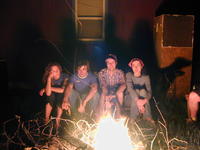|
If most vets are like me, they're going to resist meds for treatment of ptsd, resist being drugged up ... that's another element of being out of control, and we already feel like we're not enough in control.
And we're going to resist working with shrinks - especially those who have never stepped across the LD (Line of Departure) into combat. And, like, how many shrinks every even visited a battle zone, much less were shot at or wounded, much less shot at the enemy or fought hand to hand? They are probably non existent.
Is combat ptsd like other kinds of ptsd?
There might be some connection to the single incident or a few incidents type ptsd and the ptsd experienced by soldiers.
A writer in ptsdforum.org points out that soldiers are trained for ptsd ... and the incidents are long-term, a series of ongoing trauma, day after day.
My own combat was months at a time of 24 hours hypervigilence, sometimes flying into the middle of a fire fight, but more often sneaking up on a fight, knowing that the enemy was watching or that we were watching him, creeping through the jungle waiting for the trees to explode.
How can you even tell a non combat veteran about any of this? It's easier to just tell them it was a "walk in the park" -- why burden them with any of the horrors we've seen?
__________________

|